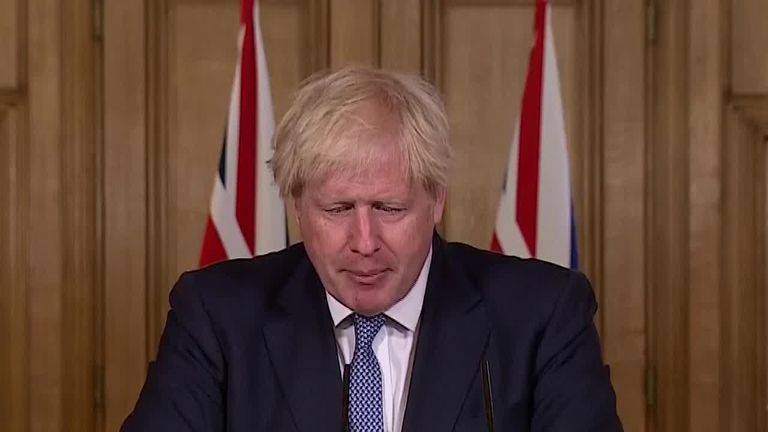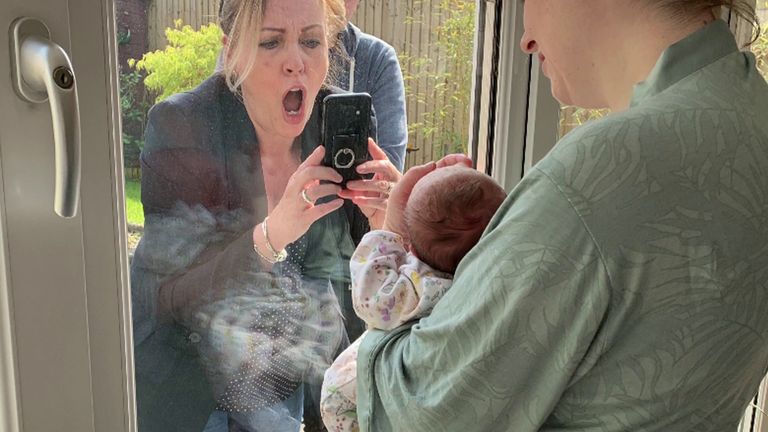The government has ended shielding advice meaning the most vulnerable during the coronavirus outbreak can now leave their home and go to work.
Some 2.2 million people with underlying severe health conditions were advised to stay at home and avoid non-essential face-to-face contact under the guidance.
Around 595,000 (28%) of those usually work, according to charities.
Shielding advice has now ended in England, Scotland and Northern Ireland.
The move comes as the government postponed the easing of certain lockdown measures with some businesses that were hoping to reopen being told they must remain closed for now.
Bowling alleys, casinos, skating rinks and beauty salons offering close-contact services like facials had been scheduled to welcome customers today for the first time since lockdown, while small wedding receptions and indoor performances were set to resume.
Their doors will stay shut for at least two more weeks after an increase in COVID-19 cases in England.
A coalition of charities is urging Chancellor Rishi Sunak to protect the jobs of workers who followed the advice, warning they will be put in an "impossible position" now that restrictions are eased.
An open letter signed by 15 charities, including Age UK and Macmillan Cancer Support, raises concerns that those who have been shielding will be forced to choose between their health and their job.
The signatories have warned these employees are at risk of being made redundant, or could be forced to return to the workplace when they do not feel it is safe to do so.
The letter to Mr Sunak says: "Our concern is that, especially as your furlough arrangements start to unwind and the shielding scheme is paused from next week, some of these workers will find themselves in an impossible position.
"This is because if their occupation is one which they cannot carry out from home, and if it is extremely difficult to make their workplace safe for them, they may be forced to choose between putting their health on the line by returning, or staying safe by giving up their job."
The signatories say this is "desperately unfair" for those who have made "great sacrifices" by staying at home, and call on the chancellor to take action and protect their jobs as well as supporting employers.
This could include extending the furlough scheme for those who have been shielding or are at high risk, the letter adds.
The same suggestion has been made by the TUC, with General Secretary Frances O'Grady telling the Guardian: "It would be heartless and reckless for employers to demand the immediate return of shielding workers.
"After self-isolation for a number of months, requiring shielding workers to immediately travel to workplaces may cause anxiety.
"The job retention scheme is in place until at least October, so employers must continue using it if home working is not an option."
A survey conducted by Macmillan Cancer Support with 2,000 adults found many cancer patients are fearful of returning to workplaces, with 42% saying they feel it is currently unsafe for them to work outside of their home.
One in three (36%) people with cancer said the coronavirus crisis has affected their finances, with some saying they have been left struggling to pay their bills.
Meanwhile a survey by Asthma UK and the British Lung Foundation of almost 4,000 people shielding in England suggested a fifth (21%) will continue to do so until there is a vaccine.
Some 40% of those surveyed said they are undecided as to what to do now that the shielding advice has ended, and two thirds said they will need to be happy that the risk of catching coronavirus is low before they stop shielding.
Employers have been told to make sure the shielded can work from home wherever possible, including moving them to another role if required, according to the government.
If employers cannot provide a COVID-safe working environment, those who are clinically vulnerable will be able to access financial support including statutory sick pay and welfare payments, it has said.
:: Listen to the Daily podcast on Apple Podcasts, Google Podcasts, Spotify, Spreaker
A government spokesperson said: "We understand how challenging the outbreak pandemic has been for the clinically vulnerable and we have worked tirelessly to support them.
"Employers must ensure the safety of those with such conditions when considering working arrangements, including whether work can be completed remotely.
"Our wide-ranging support package worth an initial £160bn includes the furlough scheme, which has paid the wages of 9.5 million people and has already been extended until October, loans, grants, and tax cuts and deferrals.
"People will also now benefit from the Job Retention Bonus which will support business and protect jobs. We also announced £750m for charities so they can continue their important work, ensuring those on the front line are able to reach people who need help."
https://news.google.com/__i/rss/rd/articles/CBMiZ2h0dHBzOi8vbmV3cy5za3kuY29tL3N0b3J5L2Nvcm9uYXZpcnVzLXNoaWVsZGluZy1hZHZpY2UtZW5kcy1hcy1sb2NrZG93bi1lYXNpbmctaXMtcHV0LW9uLWhvbGQtMTIwNDAzMTfSAWtodHRwczovL25ld3Muc2t5LmNvbS9zdG9yeS9hbXAvY29yb25hdmlydXMtc2hpZWxkaW5nLWFkdmljZS1lbmRzLWFzLWxvY2tkb3duLWVhc2luZy1pcy1wdXQtb24taG9sZC0xMjA0MDMxNw?oc=5
2020-08-01 08:15:02Z
52780968176062



Tidak ada komentar:
Posting Komentar